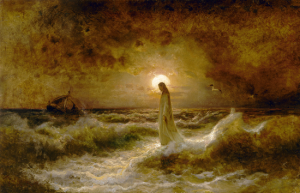John 6.37-40

There is a long standing false debate in Christian circles where some say who is saved is by God’s choice alone and others say it is up to the individual to make their personal choice as to whether to believe in Christ. It is my view, both sides in this argument do not take into account the whole of scripture. Jesus’ discourse in John 6 is helpful in making clear various responsibilities or roles that the Trinity and individuals have in the salvation process.
D L Moody was an initially unlikely nineteenth century evangelist who started adult life working in his Uncle’s shoe store and was a very reluctant church attender. However, he did become a Christian and then became a remarkable evangelist and along with his famous gospel singing collaborator Ira D. Sankey, toured the U.S. and U.K. for many years, speaking to huge crowds. Among his many accomplishments he founded what is now known as the Moody Bible Institute in Chicago. He used this illustration to show the differing perspectives of God and the seeker after God.
‘When you are saved, it’s as if you walk through a door with a sign over it saying, “Come to me all you who are weary and heavy laden and I will give you rest.” You walk through the door and when you look back, you see on the other side of the door the words, “Before the creation of the world I knew you.” (D. L. Moody)
Salvation is by God the Father’s will. Jesus said, ‘All those the Father gives me will come to me, and whoever comes to me I will never drive away.’ John6.37 He also said, ‘For my Father’s will is that everyone who looks to the Son and believes in him shall have eternal life, and I will raise them up at the last day.’ John 6.40 So we see that the Father wills, draws and gives eternal life.
How does the Father draw people and give eternal life? He does this through the work of the Holy Spirit. ‘The Spirit gives life; the flesh counts for nothing. The words I have spoken to you – they are full of the Spirit and life.’ John 6.63 The Holy Spirit uses the words of Jesus and the gospel to convict people of the truth of Christ. We see in the Acts of the Apostles how the Holy Spirit both inspires and convicts people revealing Christ and transforming lives. It is important to understand that when Jesus says, ‘the flesh counts for nothing’ it is not meant as the Gnostics interpreted it. The Gnostics considered the body and the material world were evil and only the spirit was good. John’s first letter was written in part to refute the early development of what became Gnosticism. Jesus had a physical resurrection body as will those raised to be with him on the last day.
The Son (Jesus) firstly is obedient to the Father and so achieves what is the Father’s will. ‘I come down from heaven not to do my will but to do the will of him who sent me.’ John 6.38 His role is to save, keep and raise up those who believe in the Son. John 6.39-40 Jesus achieves the reconciliation between God and people through his own death and resurrection. He expresses this through the metaphor of people eating his flesh and drinking his blood. There is no indication of this being transubstantiation, throughout the discourse he has been using the image of himself being the bread of life. Eating is believing, the blood is representing the sacrifices for sin in the Mosaic law. Without that belief there is no gift of life. ‘Jesus said to them, “Very truly I tell you, unless you eat the flesh of the Son of Man and drink his blood, you have no life in you”.’ John 6.53
Jesus words, ‘that everyone who looks on the Son and believes in him should have eternal life, and I will raise him up on the last day’ John 6.40 convey the notion that firstly it is the individual’s responsibility to recognize Jesus for who he is. However, it is more than an intellectual responsibility, belief also includes personal commitment and trust.
“Come to (him), and you will never thirst, never hunger, always be fully and eternally satisfied.” When this week will you most need to remember this?
The Old Rugged Cross




